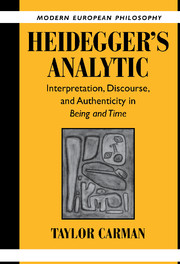6 - Authenticity and Asymmetry
Published online by Cambridge University Press: 19 July 2009
Summary
Points have we all of us within our souls Where all stand single
WordsworthThe concept of hermeneutic conditions, the lens through which I have been reading the analytic of Dasein in Being and Time, is a concept not of causal or logical conditions of intelligibility, but of the constitutive conditions of the interpretability of entities as such. To say that hermeneutic conditions are constitutive, rather than merely causal or logical, is to say that we always already have some understanding of them, however inarticulate or prethematic, just in virtue of understanding what and that entities are. The interpretability of entities is therefore tied essentially to their being, which is to say the conditions of their intelligibility as entities. Fundamental ontology, at once guiding and guided by the question concerning the meaning of being, thus has to do with the conditions of Dasein's explicit understanding of entities as such.
Moreover, the “explicitness” of understanding in interpretation, as Heidegger conceives it, lies not just in its presence before the mind, but in its expression in communicative practice broadly construed. I have argued that communication, also broadly construed, is a condition of expression, as contrasted with the mere purposiveness of practical activity. Discourse, which is to say the entire expressive-communicative dimension of Dasein's disclosedness, thus constitutes a hermeneutic condition – indeed, the hermeneutic condition par excellence.
- Type
- Chapter
- Information
- Heidegger's AnalyticInterpretation, Discourse and Authenticity in Being and Time, pp. 264 - 314Publisher: Cambridge University PressPrint publication year: 2003
- 1
- Cited by

